人教新目标(Go for it)版七年级下Unit 4 Don't eat in class. Section A Grammar Focus-3c课件(35张ppt)
文档属性
| 名称 | 人教新目标(Go for it)版七年级下Unit 4 Don't eat in class. Section A Grammar Focus-3c课件(35张ppt) | 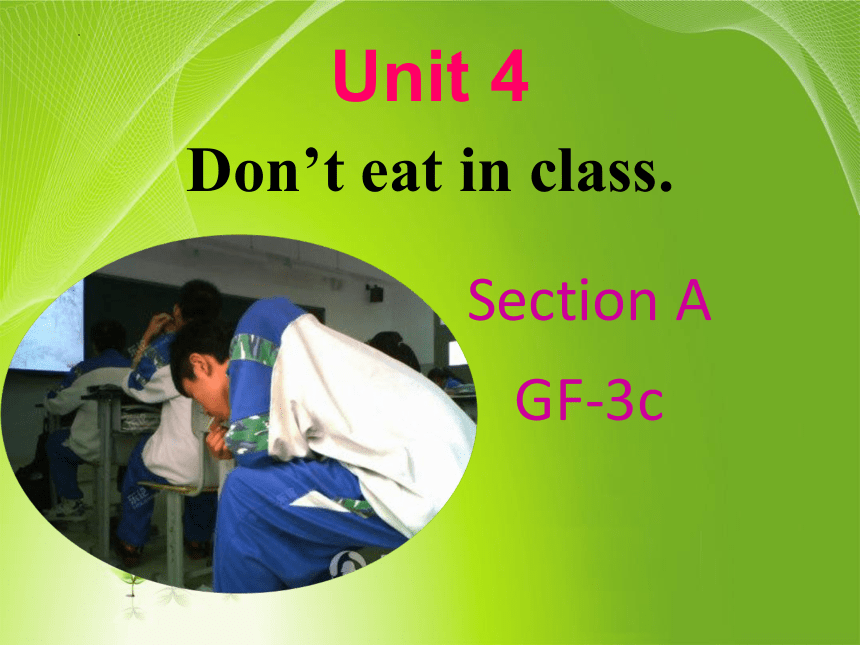 | |
| 格式 | zip | ||
| 文件大小 | 2.9MB | ||
| 资源类型 | 教案 | ||
| 版本资源 | 人教新目标(Go for it)版 | ||
| 科目 | 英语 | ||
| 更新时间 | 2022-03-04 21:11:27 | ||
图片预览

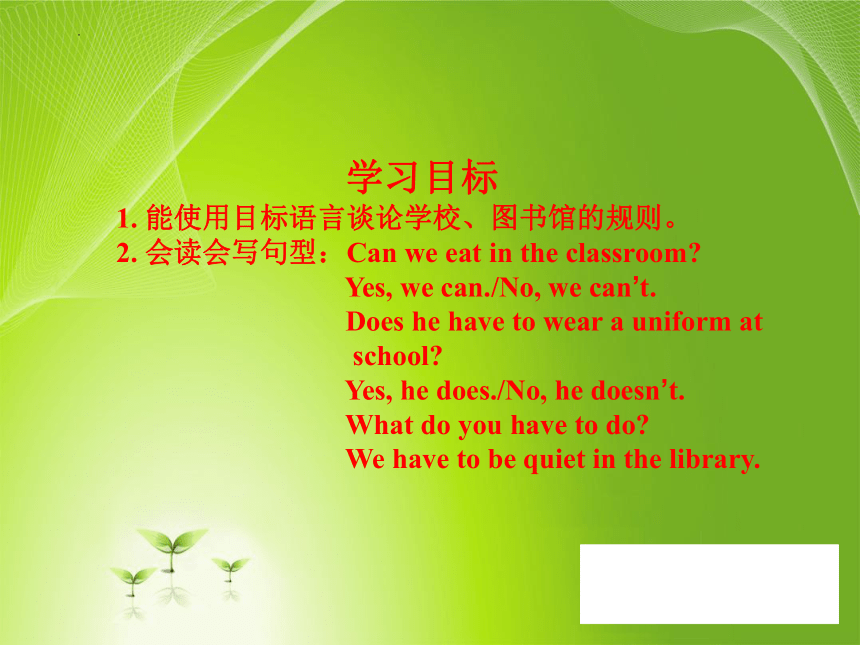

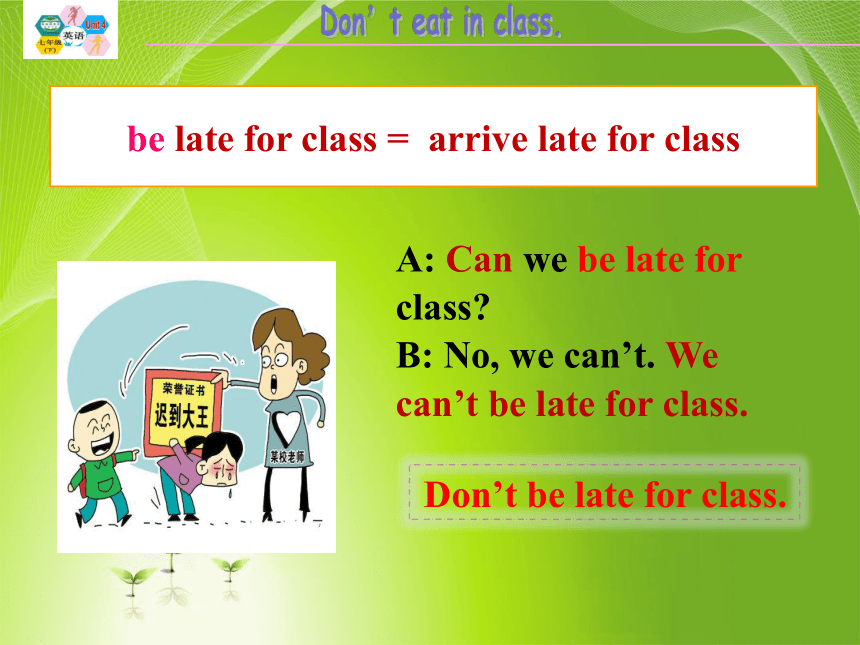
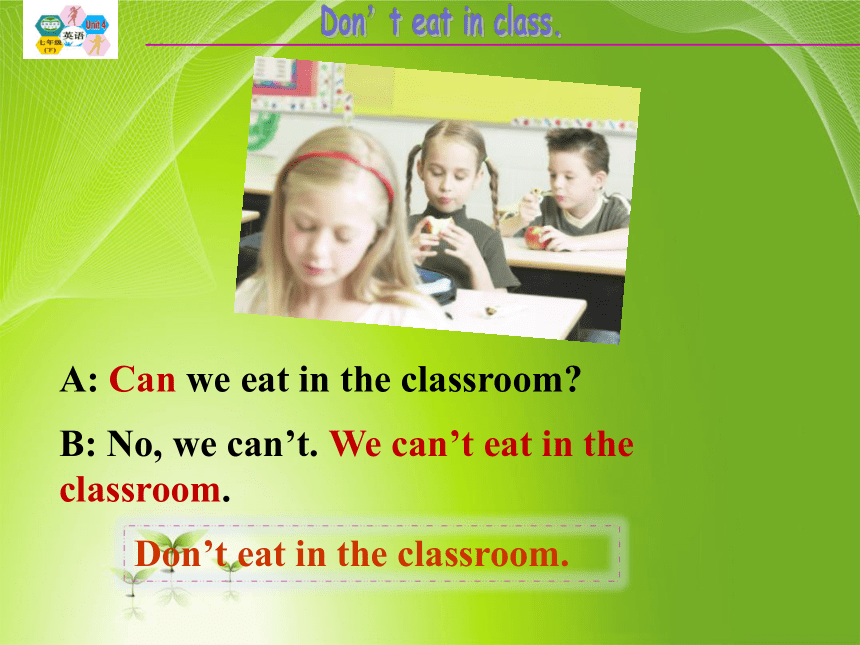
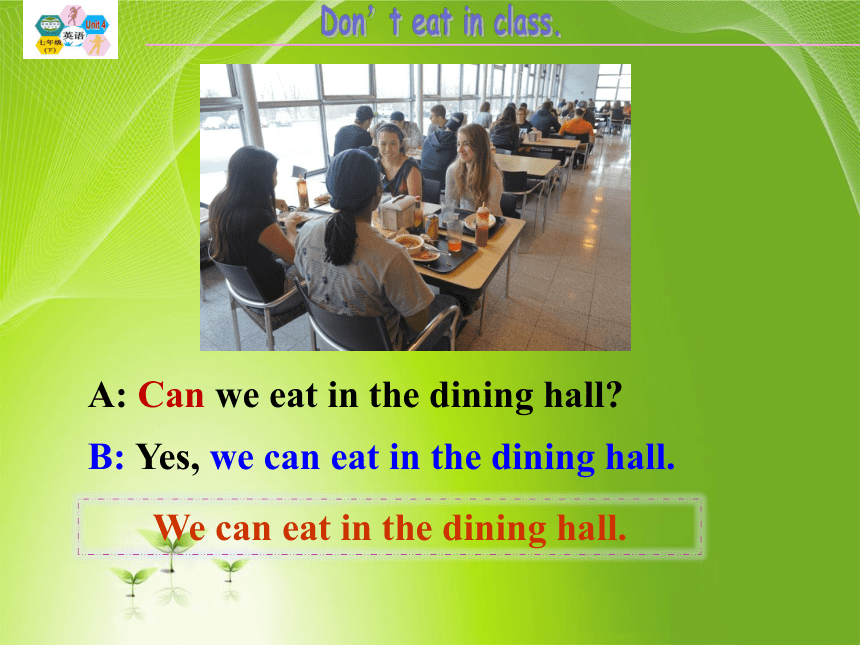
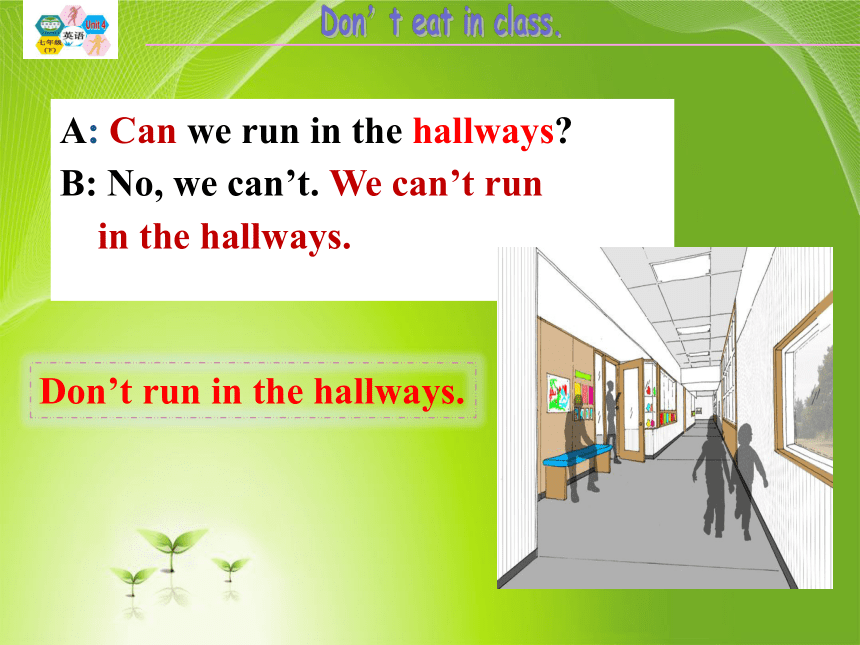
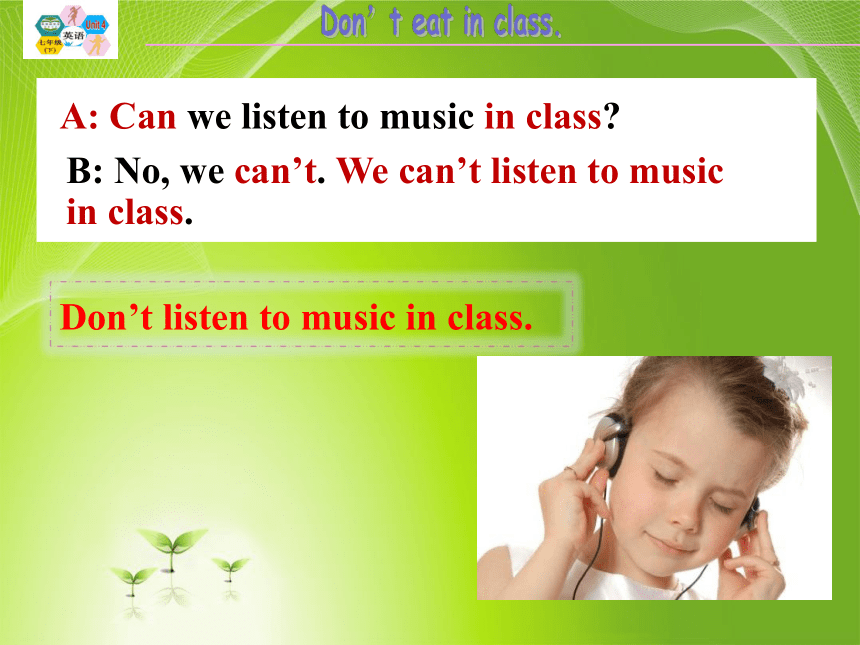
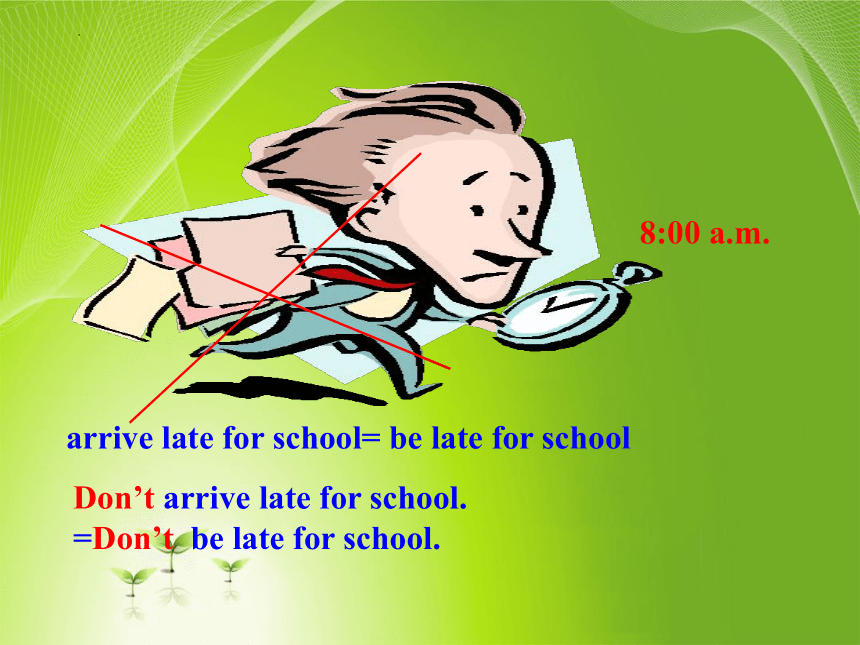
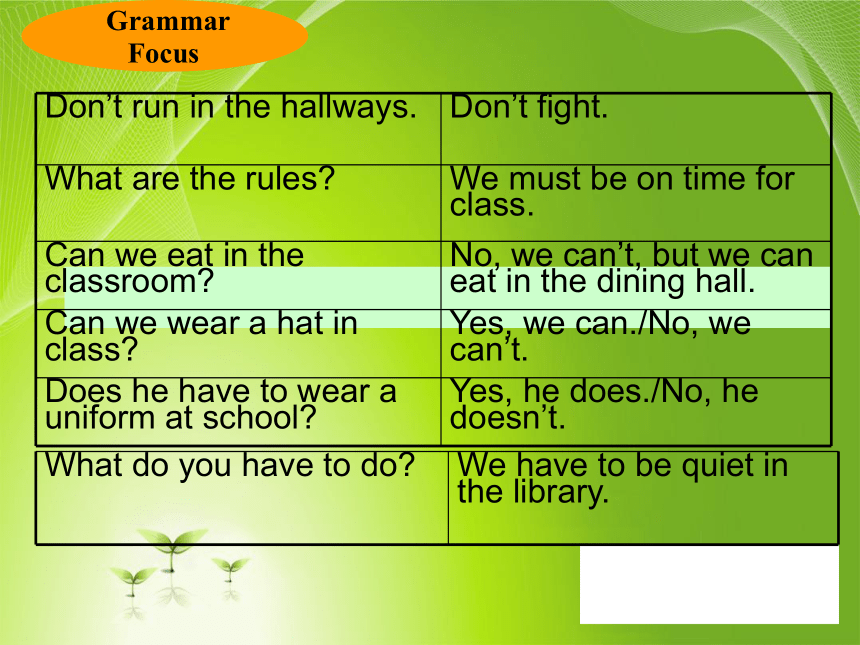
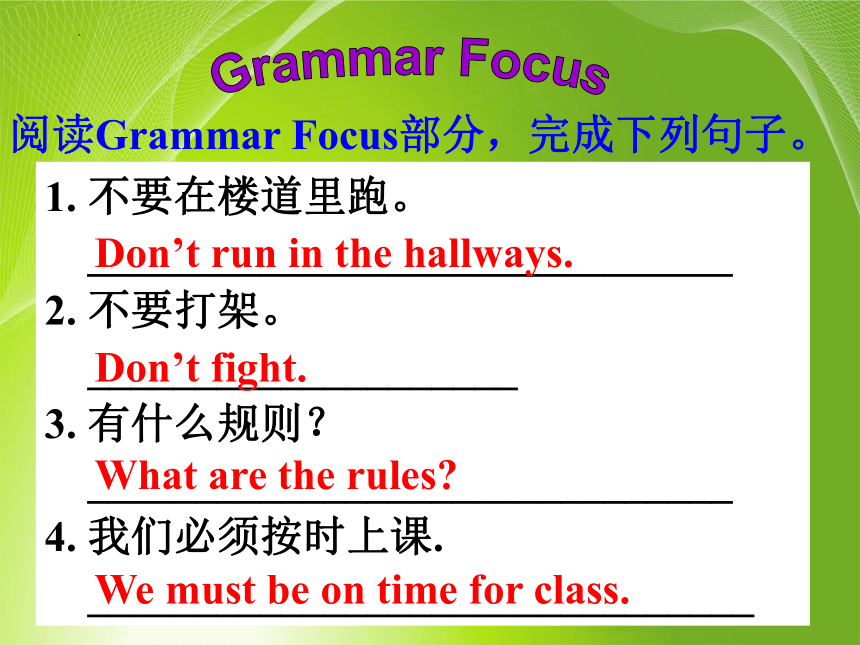
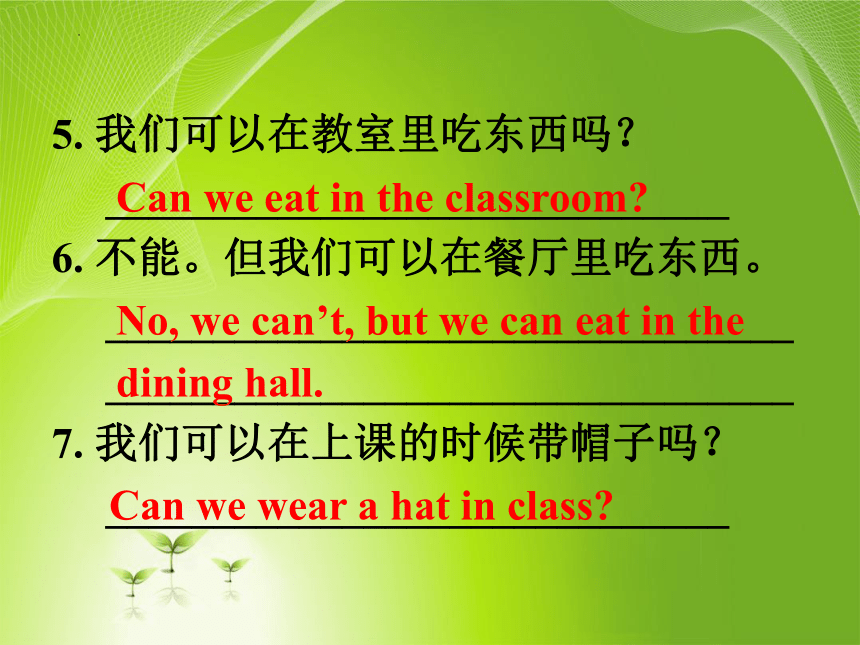
文档简介
(共35张PPT)
Unit 4
Don’t eat in class.
Section A
GF-3c
学习目标
1. 能使用目标语言谈论学校、图书馆的规则。
2. 会读会写句型:Can we eat in the classroom
Yes, we can./No, we can’t.
Does he have to wear a uniform at
school
Yes, he does./No, he doesn’t.
What do you have to do
We have to be quiet in the library.
What can we do at school
What can’t we do at school
Discussion
Don’t eat in class.
be late for class = arrive late for class
A: Can we be late for class
B: No, we can’t. We can’t be late for class.
Don’t eat in class.
Don’t be late for class.
Don’t eat in the classroom.
A: Can we eat in the classroom
B: No, we can’t. We can’t eat in the classroom.
Don’t eat in class.
We can eat in the dining hall.
A: Can we eat in the dining hall
B: Yes, we can eat in the dining hall.
Don’t eat in class.
.
A: Can we run in the hallways
B: No, we can’t. We can’t run
in the hallways.
Don’t run in the hallways.
Don’t eat in class.
A: Can we listen to music in class
B: No, we can’t. We can’t listen to music in class.
Don’t listen to music in class.
Don’t eat in class.
8:00 a.m.
arrive late for school= be late for school
Don’t arrive late for school.
=Don’t be late for school.
Don’t run in the hallways. Don’t fight.
What are the rules We must be on time for class.
Can we eat in the classroom No, we can’t, but we can eat in the dining hall.
Can we wear a hat in class Yes, we can./No, we can’t.
Does he have to wear a uniform at school Yes, he does./No, he doesn’t.
Grammar
Focus
What do you have to do We have to be quiet in the library.
1. 不要在楼道里跑。
______________________________
2. 不要打架。
____________________
3. 有什么规则?
______________________________
4. 我们必须按时上课.
_______________________________
阅读Grammar Focus部分,完成下列句子。
Don’t fight.
Don’t run in the hallways.
What are the rules
We must be on time for class.
Grammar Focus
5. 我们可以在教室里吃东西吗?
_____________________________
6. 不能。但我们可以在餐厅里吃东西。
________________________________
________________________________
7. 我们可以在上课的时候带帽子吗?
_____________________________
Can we wear a hat in class
No, we can’t, but we can eat in the dining hall.
Can we eat in the classroom
8. 他在学校里必须穿校服吗?
__________________________________
9. 是的,必须。/ 不,不必。
_______________________________
10. 你们必须做什么?
_______________________________
11. 在图书馆里我们必须保持安静。
_________________________________
Yes, he does. / No, he doesn’t.
Does he have to wear a uniform at school
What do you have to do
We have to be quiet in the library.
3a. Write the rules for the school library.
Library Rules
1.
2.
3.
4.
Don’t talk.
Don’t eat.
Don’t listen to music.
Don’t take photos.
3b. Use the words to make questions about the rules.
Be quiet
Q: Does she have to be quiet in the library
(she/have to/in the library)
A: Yes,she does.
Eat
Q:______________________________________________________
(he/have to/in the dining hall)
A:__________________
Does he have to eat in the dining hall
Yes, he does.
1. 根据例句,可知要求我们造一般疑问句并根据实际情况进行回答。
2. 先确定句子的主语。
3. 再确定用情态动词还是用助动词来构成疑问语序。
4. 根据实际情况做出肯定或否定回答,答语的主语要与问句保持一致。
方法指导
2) arrive “到达”, arrive是一个不及物动词,
不能直接跟表示地点的名词。如果要跟名词,
就必须加介词in或at。在“大地方”前加“in”;
在“小地方”前加“at”.
arrive in / at + 地点
get to +地点
reach +地点 (到达某地方 )
Listen to music
Q:______________________________________________________
(we/can/in the hallways)
A:__________________
Wear a hat
Q:______________________________________________________
(we/can/in the classroom)
A:__________________
Can we listen to music in the hallways
No, we can’t.
Can we wear a hat in the classroom
No, we can’t.
2. Eat (he/have to/in the dining hall)
Q: ________________________________
A: _____________
3. Listen to music (we/can/in the hallways)
Q: ________________________________
A: _____________
4. Wear a hat (we/can/in the classroom)
Q: _____________________________
A: ____________
Then answer the questions.
Yes, he does.
Does he have to eat in the dining hall
Can we listen to music in the hallways
No, we can’t.
Can we wear a hat in the classroom
No, we can’t.
We can eat in class.
We don’t have to come to school every day.
…
3c. Make up five cool rules for your dream school. Share your rules with the class. Your classmates vote for the Coolest School!
At my dream school, we don’t have to come to school every day. We …
4. Make our school rules
Dear students:
In order that we can have a good environment (环境). We should have some rules in our school. Here are some suggestions, we hope that all of us can have a look at them.
1. Don’t sleep in class.
2. Clean the classroom everyday.
3. __________________________
4. __________________________
5. __________________________
6. __________________________
Yours ____
FAMILY RULES
1.Don’t talk loudly.
2.____________________________________
3.____________________________________
4.___________________________________
5.____________________________________
6.___________________________________
Don’t watch TV late at night
Turn off the lights when you leave the room.
Don’t waste water.
Don’t sleep too late.
Don’t eat and read at the same time.
点此播放朗读视频
Language Points
1. --What are the rules 规则是什么?
--Well, we can't arrive late for class.
哦, 我们上课不能迟到。
1) rule规则, 可数名词, 构成的短语有:
obey the rules 遵守规章
be against the rules
break the rules
违反规章
school rules 校纪 = the rules of the school
class rules 班规 = the rules of the class
※ rule还可以用作动词, 意为“统治, 支配”。
e.g. The king ruled the country 500 years ago.
500年前, 国王统治着这个国家。
1. My mother usually get ___ school at 7:40 in the morning.
2. When do you usually arrive ____ the bus station
3. Jenny’s uncle usually arrives ___ Shanghai in the evening.
选词填空: in, at, to
to
in
at
2. hear, listen和sound都有“听”的意思,
但三者是有区别的。
1) hear “听说“, 侧重于”听”的内容。例如:
I'm sorry to hear that you are ill.
听说你生病了, 我很难过。
I never heard such an interesting story.
我从来没听过这么有趣的一个故事。
2) listen“听”侧重于“听”这一动作。
如果后面跟要听的事物,应跟介词to再跟事物
Listen to me carefully. 认真听我说。
The children like to listen to music.
孩子们喜欢听音乐。
3) sound“听起来”, 它是系动词, 后面
接形容词等。例如:
That sounds great. 那听起来真不错。
It sounds like fun. 听起来挺有趣。
3. fight 打架,争吵
1) 作动词用
Jack never fights with his brother.
杰克从不和他的弟弟打架。
2) 作名词,意为“打架;争吵”; 常用词组have a fight“打架;吵架”
Did you have a fight with her
你和她吵过架吗?
4. have to与must
1) have to意为“必须做某事”强调“客观需要”
They have to wear school uniforms every day.
他们每天必须穿校服。
2) must 意为“必须”强调主观上的愿望
It’s late. I must go home now.
天晚了。现在我必须要回家。
练一练:用have to, must 填空
1. It’s cold outside. We ______ stay at
home.
2. We ____ be good with our parents.
have to
must
5. What else do you have to do
else “其它的”, 用来修饰something, anything ,
nothing等, 还可用来修饰疑问词 what,
where, who等, else修饰疑问词或不定代词时,
应后置。例如:
Do you have anything else to do .
Who else did you see
Summary
1. 了解学校、图书馆的规则。
2. 学会了有关祈使句用法。
3. 掌握have to 的用法。
1. He has to eat breakfast quickly. (改为一般疑问句)
__________________________________
2. Play volleyball after class. (改为否定句)
________________________________
句型转换
Does he have to eat breakfast quickly
Don’t play volleyball after class.
exercise
3. We can wear sports shoes in class. (改为一般疑问) ______________________________
4. Don’t arrive late for class. (改为同义句)
_______________________________
5. Eric has to do his homework before six. (对划线部分提问)
___________________________________
Can we wear sports shoes in class
We must be on time for class.
What does Eric have to do before six
Homework
1.默写Unit 4 section A的单词
2.预习Section B (1a—1d)
Unit 4
Don’t eat in class.
Section A
GF-3c
学习目标
1. 能使用目标语言谈论学校、图书馆的规则。
2. 会读会写句型:Can we eat in the classroom
Yes, we can./No, we can’t.
Does he have to wear a uniform at
school
Yes, he does./No, he doesn’t.
What do you have to do
We have to be quiet in the library.
What can we do at school
What can’t we do at school
Discussion
Don’t eat in class.
be late for class = arrive late for class
A: Can we be late for class
B: No, we can’t. We can’t be late for class.
Don’t eat in class.
Don’t be late for class.
Don’t eat in the classroom.
A: Can we eat in the classroom
B: No, we can’t. We can’t eat in the classroom.
Don’t eat in class.
We can eat in the dining hall.
A: Can we eat in the dining hall
B: Yes, we can eat in the dining hall.
Don’t eat in class.
.
A: Can we run in the hallways
B: No, we can’t. We can’t run
in the hallways.
Don’t run in the hallways.
Don’t eat in class.
A: Can we listen to music in class
B: No, we can’t. We can’t listen to music in class.
Don’t listen to music in class.
Don’t eat in class.
8:00 a.m.
arrive late for school= be late for school
Don’t arrive late for school.
=Don’t be late for school.
Don’t run in the hallways. Don’t fight.
What are the rules We must be on time for class.
Can we eat in the classroom No, we can’t, but we can eat in the dining hall.
Can we wear a hat in class Yes, we can./No, we can’t.
Does he have to wear a uniform at school Yes, he does./No, he doesn’t.
Grammar
Focus
What do you have to do We have to be quiet in the library.
1. 不要在楼道里跑。
______________________________
2. 不要打架。
____________________
3. 有什么规则?
______________________________
4. 我们必须按时上课.
_______________________________
阅读Grammar Focus部分,完成下列句子。
Don’t fight.
Don’t run in the hallways.
What are the rules
We must be on time for class.
Grammar Focus
5. 我们可以在教室里吃东西吗?
_____________________________
6. 不能。但我们可以在餐厅里吃东西。
________________________________
________________________________
7. 我们可以在上课的时候带帽子吗?
_____________________________
Can we wear a hat in class
No, we can’t, but we can eat in the dining hall.
Can we eat in the classroom
8. 他在学校里必须穿校服吗?
__________________________________
9. 是的,必须。/ 不,不必。
_______________________________
10. 你们必须做什么?
_______________________________
11. 在图书馆里我们必须保持安静。
_________________________________
Yes, he does. / No, he doesn’t.
Does he have to wear a uniform at school
What do you have to do
We have to be quiet in the library.
3a. Write the rules for the school library.
Library Rules
1.
2.
3.
4.
Don’t talk.
Don’t eat.
Don’t listen to music.
Don’t take photos.
3b. Use the words to make questions about the rules.
Be quiet
Q: Does she have to be quiet in the library
(she/have to/in the library)
A: Yes,she does.
Eat
Q:______________________________________________________
(he/have to/in the dining hall)
A:__________________
Does he have to eat in the dining hall
Yes, he does.
1. 根据例句,可知要求我们造一般疑问句并根据实际情况进行回答。
2. 先确定句子的主语。
3. 再确定用情态动词还是用助动词来构成疑问语序。
4. 根据实际情况做出肯定或否定回答,答语的主语要与问句保持一致。
方法指导
2) arrive “到达”, arrive是一个不及物动词,
不能直接跟表示地点的名词。如果要跟名词,
就必须加介词in或at。在“大地方”前加“in”;
在“小地方”前加“at”.
arrive in / at + 地点
get to +地点
reach +地点 (到达某地方 )
Listen to music
Q:______________________________________________________
(we/can/in the hallways)
A:__________________
Wear a hat
Q:______________________________________________________
(we/can/in the classroom)
A:__________________
Can we listen to music in the hallways
No, we can’t.
Can we wear a hat in the classroom
No, we can’t.
2. Eat (he/have to/in the dining hall)
Q: ________________________________
A: _____________
3. Listen to music (we/can/in the hallways)
Q: ________________________________
A: _____________
4. Wear a hat (we/can/in the classroom)
Q: _____________________________
A: ____________
Then answer the questions.
Yes, he does.
Does he have to eat in the dining hall
Can we listen to music in the hallways
No, we can’t.
Can we wear a hat in the classroom
No, we can’t.
We can eat in class.
We don’t have to come to school every day.
…
3c. Make up five cool rules for your dream school. Share your rules with the class. Your classmates vote for the Coolest School!
At my dream school, we don’t have to come to school every day. We …
4. Make our school rules
Dear students:
In order that we can have a good environment (环境). We should have some rules in our school. Here are some suggestions, we hope that all of us can have a look at them.
1. Don’t sleep in class.
2. Clean the classroom everyday.
3. __________________________
4. __________________________
5. __________________________
6. __________________________
Yours ____
FAMILY RULES
1.Don’t talk loudly.
2.____________________________________
3.____________________________________
4.___________________________________
5.____________________________________
6.___________________________________
Don’t watch TV late at night
Turn off the lights when you leave the room.
Don’t waste water.
Don’t sleep too late.
Don’t eat and read at the same time.
点此播放朗读视频
Language Points
1. --What are the rules 规则是什么?
--Well, we can't arrive late for class.
哦, 我们上课不能迟到。
1) rule规则, 可数名词, 构成的短语有:
obey the rules 遵守规章
be against the rules
break the rules
违反规章
school rules 校纪 = the rules of the school
class rules 班规 = the rules of the class
※ rule还可以用作动词, 意为“统治, 支配”。
e.g. The king ruled the country 500 years ago.
500年前, 国王统治着这个国家。
1. My mother usually get ___ school at 7:40 in the morning.
2. When do you usually arrive ____ the bus station
3. Jenny’s uncle usually arrives ___ Shanghai in the evening.
选词填空: in, at, to
to
in
at
2. hear, listen和sound都有“听”的意思,
但三者是有区别的。
1) hear “听说“, 侧重于”听”的内容。例如:
I'm sorry to hear that you are ill.
听说你生病了, 我很难过。
I never heard such an interesting story.
我从来没听过这么有趣的一个故事。
2) listen“听”侧重于“听”这一动作。
如果后面跟要听的事物,应跟介词to再跟事物
Listen to me carefully. 认真听我说。
The children like to listen to music.
孩子们喜欢听音乐。
3) sound“听起来”, 它是系动词, 后面
接形容词等。例如:
That sounds great. 那听起来真不错。
It sounds like fun. 听起来挺有趣。
3. fight 打架,争吵
1) 作动词用
Jack never fights with his brother.
杰克从不和他的弟弟打架。
2) 作名词,意为“打架;争吵”; 常用词组have a fight“打架;吵架”
Did you have a fight with her
你和她吵过架吗?
4. have to与must
1) have to意为“必须做某事”强调“客观需要”
They have to wear school uniforms every day.
他们每天必须穿校服。
2) must 意为“必须”强调主观上的愿望
It’s late. I must go home now.
天晚了。现在我必须要回家。
练一练:用have to, must 填空
1. It’s cold outside. We ______ stay at
home.
2. We ____ be good with our parents.
have to
must
5. What else do you have to do
else “其它的”, 用来修饰something, anything ,
nothing等, 还可用来修饰疑问词 what,
where, who等, else修饰疑问词或不定代词时,
应后置。例如:
Do you have anything else to do .
Who else did you see
Summary
1. 了解学校、图书馆的规则。
2. 学会了有关祈使句用法。
3. 掌握have to 的用法。
1. He has to eat breakfast quickly. (改为一般疑问句)
__________________________________
2. Play volleyball after class. (改为否定句)
________________________________
句型转换
Does he have to eat breakfast quickly
Don’t play volleyball after class.
exercise
3. We can wear sports shoes in class. (改为一般疑问) ______________________________
4. Don’t arrive late for class. (改为同义句)
_______________________________
5. Eric has to do his homework before six. (对划线部分提问)
___________________________________
Can we wear sports shoes in class
We must be on time for class.
What does Eric have to do before six
Homework
1.默写Unit 4 section A的单词
2.预习Section B (1a—1d)
同课章节目录
- Unit 1 Can you play the guitar?
- Section A
- Section B
- Unit 2 What time do you go to school?
- Section A
- Section B
- Unit 3 How do you get to school?
- Section A
- Section B
- Unit 4 Don't eat in class.
- Section A
- Section B
- Unit 5 Why do you like pandas?
- Section A
- Section B
- Unit 6 I'm watching TV.
- Section A
- Section B
- Review of Units 1-6
- Unit 7 It's raining!
- Section A
- Section B
- Unit 8 Is there a post office near here?
- Section A
- Section B
- Unit 9 What does he look like?
- Section A
- Section B
- Unit 10 I'd like some noodles.
- Section A
- Section B
- Unit 11 How was your school trip?
- Section A
- Section B
- Unit 12 What did you do last weekend?
- Section A
- Section B
